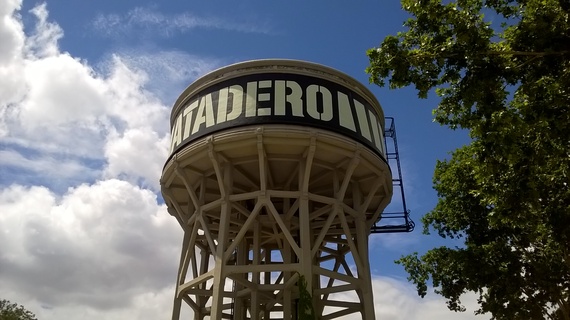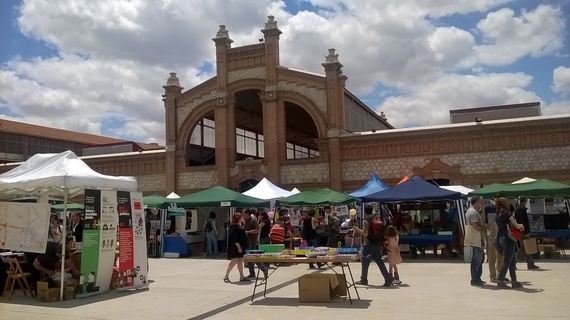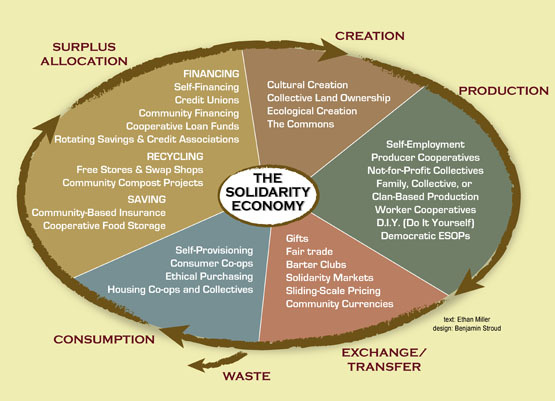The majority of times we think we are not free to think of the world as a unity of people all working towards human development, evolution and res-publica, which- as the Greeks taught us- means contributing to the development of the society's state of the art.
I think the Greeks (along with the Romans) became the pioneers and the propellers of the management of "res publica". Democracy for them meant taking care of the people and of the res-of the things- that the citizens created for the good and the progress of society's hustle and bustle. Just think of horses and carriages, and of metro and cars. Two alternative and revolutionary ways, for the times, to facilitate transport and to allow people to freely move around the city and to get business and trade done, providing food and shelter to family and kids.
In modern times, I perceive and I see on a day to day basis that if we stand by the ideals of social justice, solidarity economy, participatory economics, the work of cooperatives, human dignity and equal rights between genders and at work, independent and free press, sustainable consumption, eco-markets and green economy, ethical banks, fair trade and food security and sovereignty, social inclusion and cultural diversity, sustainable development, ecological sustainability, corporate social responsibility in businesses, micro finance and micro-credit, we are not taking the res-management into consideration, but we only think of nature, utopia and social well-fare where people are at the center of the discourse.
Recently I visited the third edition of the Social and Solidarity Economy Fair, which took place at Matadero, an open, free and eco-cultural center in Madrid offering a wide variety of cultural events - including bike rentals and an impressive film library- aimed at raising awareness and stimulating debates around society's problems and potentials solutions, powered by participatory mechanisms, constant dialogue, ideas and group brainstorming, critical thinking and new and better ways of imagining the future, and therefore of creating it.
Social Market is a system of production, distribution and consumption of goods and services that works by adopting ethical, just, democratic, ecological and solidarity principles, consisting of businesses and cooperatives, as well as groups of consumers, striving to pursue an economic activity that does not damage the environment and works for salary equality, gender policy and whose objective is to satisfy a good amount of the society's needs within the community network, disconnecting the solidarity economy from the capitalist one. By re-adjusting the modern version of the economy, understood now as a vicious cycle of money and goods accumulation, we can manage to retrieve the first meaning of the economy to its real role of provider of the material ground to sustainably contribute to the personal, social and environmental development of the human being.
According to the Charter of Principles of the Solidarity Economy, the Economic effective and efficient management is reached by abiding by the laws of fairness, justice, economic fraternity, social solidarity and direct democracy. And a new way of producing, consuming and distributing, is proposed as a viable, a responsible and a sustainable alternative to the satisfaction of the individual and global needs and aims to consolidate itself as a tool for social transformation.
If we are able to apply the management tools and practices from the economic models we studied in theory and books, as well as, for instance, Michael Porter's concept of "creating shared-value", our methodological and statistical knowledge of macroeconomic policies, the business management practices we apply in our everyday work, in a more "social" and "responsible" way of working, all our community will benefit.
First of all, our close working team and organization community will see the positive consequences of our actions, moved by the welfare of our community, and not by mere profits. Globally speaking, our actions will directly cascade to the organizations and the businesses we are closely working with, and indirectly will have sound repercussions on the way of working of other "far-way" (not that far thanks to technology and digital communication) organizations, which have the opportunity to witness a new model of economy, and practically test it if they wish, asserting that social and solidarity change is possible through concrete actions and effective results ( and efficient management).
Combining sound hard-skill management methods and processes with the affirmation of the importance of recovering the human, social, political, economic and cultural dimension of work that allows the development of the abilities of people, producing goods and services, to meet the real needs of the population, is possible.
Jobs creation can take a new form and work should be seen a key element in the quality of life of the people, the community and the economic relations between citizens, peoples and the States.
Here below I wish to share a list of interesting websites of cooperatives I discovered during the fair, for additional information and research on alternative models of economy, social & solidarity economy, as well as the powerful connection of ecology and economy (most of the links are in Spanish only):
•Challenging the crisis
• Economistas sin fronteras
•Portal de Economia Solidaria
•Market and Sustainable Consumption, Digital platform directly connecting producers and consumers
•Examples of Self-Financing and free & independent Press: Diagonal / La Marea
•FIARE Ethical Bank / Alternativas Economicas
•El Fetichismo del PIB, September 20th 2009- article from El Pais by Joseph Stiglitz
•Commission for the measurement of Economic Performance and social progress
•Make a sustainable planetary society possible, Vision 2050, the New Agenda for Business issued by the World Business Council for Sustainable Development
•The Brundtland Report, Our Common Future, 1987
Hasta pronto!
@GaiaParadiso



